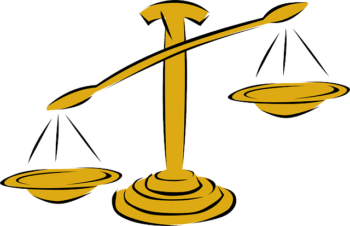How to Use the Chinese Character 比 (bǐ) Posted by Ayana on Apr 28, 2021 in Grammar
The character 比 (bǐ) is commonly used when making comparisons. The Chinese dictionary defines 比 as: 较量高低、长短、远近、好坏等 (jiào liàng gāo dī, cháng duǎn, yuan jìn, hǎo huài děng.) Which means to measure up against attributions such as height, length, distance, good or bad, etc. 比 can be translated as than, but its sentence structure is different from the one of its English equivalent.
The basic sentence structure of 比 sentences is:
Noun A + 比 + Noun B + Adjective
比 sits between the two things being compared, and noun B is being compared against Noun A. Several years ago, for example, when Yao Ming and Yi Jianlian (two Chinese NBA players) were interviewed together, the reporter asked who of them is a better player. Yao Ming said Yi is better, and explained: 我比他老 (wǒ bǐ tā lǎo), which means I’m older than him. The first noun appear in the sentence above is I (我), but instead of being followed by a description as in the English translation, is being used as an indicative for which noun the I is being compared. I compare to him (他), and only then is it mentioned by which measurement. In this case they are compared by age: Yao is older than Yi.
The 比 sentence can be reversed. If Yao Ming wished to point out that Yi Jianlian is younger than he is, he should have replaced the nouns and chosen the antonym adjective. He should have placed Yi at the beginning of the comparison sentence, and describe him as younger: 他比我年轻 (tā bǐ wǒ nián qīng), meaning he is younger than me. Both examples are correct and mean the same, you just need to pay attention to the right order, and to remember the second noun is being compared against the first noun.
Check out some more examples:
他比我高。
Tā bǐ wǒ gāo.
He is taller than me.
女人比男人的预期寿命长。
Nǚ rén bǐ nán rén de yù qí shòu mìng zhǎng.
Women have a longer life expectancy than men.
今天比昨天冷。
Jīn tiān bǐ zuó tiān lěng.
Today is colder than yesterday.
她做饭的手艺比你的好。
Tā zuò fàn de shǒu yì bǐ nǐ de hǎo.
Her cooking skills are better than yours.
Comparison between two things that share the same feature is constructed by adding 更 (gèng), which means even more. Upgrading the comparison with 更 expresses the idea that while both nouns can be described by the same adjective, the first noun has more of this quality. In this sentence structure 更 should be added before the adjective. For example, the Chinese supermodel Liu Wen once said: 我妈妈比我更漂亮 (wǒ mā bǐ wǒ gèng piào liang), meaning my mother is more beautiful than me.
Check out some more examples:
他比我更高。
Tā bǐ wǒ gèng gāo.
He is even taller than me.
她比教授更聪明。
Tā bǐ jiào shòu gèng cōng míng.
She is even smarter than the professor.
你做的饭比这个饭馆的菜更好吃。
Nǐ zuò de fàn bǐ zhè ge fàn guǎn de cài gèng hào chī.
Your food is more delicious than the dishes in this restaurant.
俄罗斯的冬天比这个地方的冬天更冷。
È luó sī de dōng tiān bǐ zhè ge dì fāng de dōng tiān gèng lěng.
The Russian winter is even colder than winter in this place.
As you have probably noticed in the examples above, the adjective used in the comparison should be positive, not negative. In English you can say your apartment is not bigger than mine. In Chinese, though, you cannot add 不 (bù, not) before the adjective, and make the description negative. In this case you can say 我的房间比你的房间大 (wǒ de fang jiān bǐ nǐ de fang jiān dà, my apartment is bigger than yours), or if both apartments are the same size you should use a different structure: 我的房间跟你的一样大 (wǒ de fang jiān gēn nǐ de yī yàng dà), meaning my apartment is as big as yours.
The word 不, though, appears in the phrase 比不上 (bǐ bù shàng), which means can’t compare with. The phrase comes to praise someone or something as unbeaten, someone or something that is not equal to others. Usage of this phrase is similar to the usage of 比; both sentences structure are quite the same: the phrase sits between two nouns. For example:
我比不上你的男朋友。
Wǒ bǐ bù shàng nǐ de nán péng yǒu.
I can’t beat your boyfriend.
世界上的所有都比不上一个好朋友。
Shì jiè shàng de suǒ yǒu dōu bǐ bù shàng yī gè hǎo péng yǒu.
Nothing in the world can compare to a good friend.
下国际象棋谁也比不上她。
Xià guó jì xiàng qí shéi yě bǐ bù shàng tā.
No one can match her at chess.
什么都比不上单恋的痛苦。
Shén me dōu bǐ bù shàng dān liàn de tòng kǔ.
Nothing is as painful as unrequited love.
渴的时候什么东西也比不上一杯凉水。
Kě de shí hòu shén me dōng xī yě bǐ bù shàng yī bēi liáng shuǐ.
When you are thirsty, there is nothing like a glass of cold water.
好好学习,天天向上!

Build vocabulary, practice pronunciation, and more with Transparent Language Online. Available anytime, anywhere, on any device.





Comments:
Tim:
Negative adjectives can also be used in the same construction.
他的成绩比我差。 His grade is worse than mine.
小明比小华弱。Xiao Ming is weaker than Xiao Hua.
Regarding “In English you can say your apartment is not bigger than mine. In Chinese, though, you cannot add 不 (bù, not) before the adjective, and make the description negative”, the very same construction in Chinese in to put 不 in front of 比:
你的房子不比我的大. Your apartment is not larger than mine.
你的房子比我的大. Your apartment is larger than mine.
我不比他胖。 I am not fatter than he is.
我比他胖。I am fatter than he is.